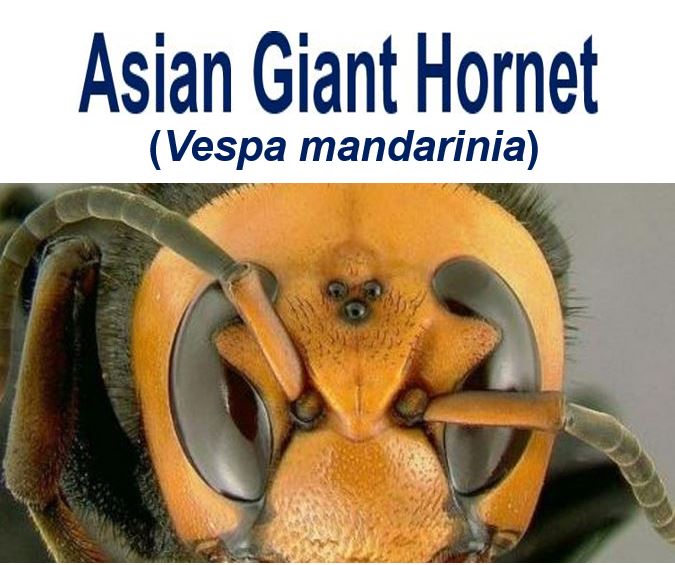Killer Asian giant hornets, which average 2 inches in length and have killed six people in France, appear to be making their way to Sussex and Kent in England, bee experts fear. The intruder hornets, which not only pose a threat to susceptible humans, but also domestic honeybee populations, will be discussed at a summit meeting by beekeepers.
The Asian giant hornet is known to kill bees one by one until the colony is exhausted. They then move in and take all the honey.
The Asian giant hornet (Vespa mandarinia), known colloquially as the yak-killer hornet, originates from temperate and tropical Eastern Asian regions. Experts believe that got into France in some Chinese pot plants nine years ago.

Vespa mandarinia is the top of the insect food chain. It hunts bees for their honey.
These huge hornets, the world’s largest, can destroy as many as 30,000 bees in just two hours. Honey production in France has been devastated, partly due to the hornet invasion.
The National Bee Unit is holding a meeting on May 23, along with beekeeping associations from across the country. The National Bee Unit delivers the Bee Health Programmes on behalf of Defra (Department for Environment Food and Rural Affairs).
The Daily Mail quoted Norfolk Beekeepers’ Association chairman Carolyne Liston, who warned that Asian giant hornets are:
“(A) very, very aggressive predator’ and said they could ‘come here on the wind. They can absolutely decimate colonies and we are concerned that it is going to come in on someone’s caravan who has been travelling in France.”
Look out for Asian giant hornet nests
Defra has told British beekeepers to be alert for the possible presence of Asian hornets, which make nests in tall trees, sheds and garages. People have been warned not to approach the nests.
If you see a hornet’s nest you should either contact your local council or find a local pest control company.
If Asian hornets are identified in the UK, the National Bee Unit will send experts from the Animal Health Veterinary Laboratories Agency to destroy them using targeted chemicals.
In 2014, the Government prepared a contingency plan in case Asian giant hornets were discovered in the UK. In the Queen’s speech, a law was announced which gives officials powers to enter private land and destroy new invasive species.

An Asian giant hornet on a human finger. Entomologist, Masato Ono, from Tamagawa University, Japan, described the sensation of being stung “like a hot nail being driven into my leg.”
Asian giant hornet sting
The insect’s sting is about one-quarter of an inch long. It injects a potent venom. However, only humans who are allergic to the sting are at risk of dying, unless you are attacked by a swarm.
In Japan, authorities say approximately thirty to forty people are killed annually after being stung by an Asian giant hornet.
Chinese health authorities advise their citizens to get medical help if they have been stung more than 10 times, and to get emergency treatment after 30 stings. The stings can cause kidney failure.
In 2014, the Asian giant hornet was responsible for 41 human deaths and 1,600 injuries in the Shaanxi province in China.
